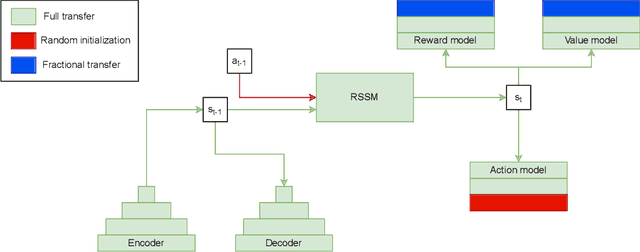Fractional Transfer Learning for Deep Model-Based Reinforcement Learning
Paper and Code
Aug 14, 2021



Reinforcement learning (RL) is well known for requiring large amounts of data in order for RL agents to learn to perform complex tasks. Recent progress in model-based RL allows agents to be much more data-efficient, as it enables them to learn behaviors of visual environments in imagination by leveraging an internal World Model of the environment. Improved sample efficiency can also be achieved by reusing knowledge from previously learned tasks, but transfer learning is still a challenging topic in RL. Parameter-based transfer learning is generally done using an all-or-nothing approach, where the network's parameters are either fully transferred or randomly initialized. In this work we present a simple alternative approach: fractional transfer learning. The idea is to transfer fractions of knowledge, opposed to discarding potentially useful knowledge as is commonly done with random initialization. Using the World Model-based Dreamer algorithm, we identify which type of components this approach is applicable to, and perform experiments in a new multi-source transfer learning setting. The results show that fractional transfer learning often leads to substantially improved performance and faster learning compared to learning from scratch and random initialization.
 Add to Chrome
Add to Chrome Add to Firefox
Add to Firefox Add to Edge
Add to Edge